- Home
- Richard Matheson
Lyrics Page 2
Lyrics Read online
Page 2
has its points it’s true.
But it has its drawbacks too.
There is an appalling dearth
of private time.
Nine times out of ten
it’s just a bore sublime.
Chorus:
A princess has a full-time job.
She never
has a chance to say
I wonder what I’m
going to do today.
Her schedule
is so awfully taken up that
she is on the go
from morning ‘til night
And that isn’t right
you know
First we ride for an hour
And then out to the bower
for some tea
and some very dreary talks
And the evening abounds
with impossible rounds
of dancing and chatting
and walks.
In concluding
my sad tale to tell.
A princess has to
go through – “well” (spoken)
so terribly much
I can barely restrain a sob.
Yes, a princess
has a full-time job!
I can locate only the verse to a song called IN KING ARTHUR. Where the chorus went is anybody’s guess.
Verse:
In those days
those far-off days.
When knighthood was a flower.
The men knew how
to win their girls
and get them in their power.
Which, I suppose, gives you some notion of the musical’s plot. Since I didn’t write the book I don’t recall the story. I wrote music but there are no lyrics attached to some of it. Concluding the show was a lively chorus song. (At least it read lively on the ms.) No verse.
LAUGHING IS EASY
Laughing is easy
if only you’re happy
Just throw back your head
and go ha-ha-ha-ha-ha!
Laughing is easy
The best way to prove it
is try – is to try – is to try – is to try!
Solo:
Ask the wise man to tell you
and he will certainly say
the wisest man has a method
of laughing and laughing
his troubles away!
Chorus:
Laughing is easy
the easiest thing
in this silly old world
full of weal and of woe.
The point to our story
is let yourself go – yourself go
yourself go!
And chase your troubles away!
You’ll find they never stay!
Never never stay
never never stay
(Alternate voices to get staccato effect)
Ha-ha-ha-ha-ha!
Ha-ha-ha-ha-ha-ha!
Ha-ha-ha-ha!
Ha-ha-ha-ha-ha-ha!
(Heavy piano chord)
HA!
* * * *
In the summer of 1947, while collaborating with a close friend, Norman Kennelly (a fellow Brooklynite) on a comedy which we hoped would be the 1948 Journalism show, I decided to write my own musical which I called O PIONEER! Whether or not I thought it might be a second entry into the J. Show contest is impossible to recall. It wouldn’t have mattered since I never finished it. The one remaining line of dialogue that comes to mind is from some old coot who chortles, “Slick as a peeled onion!”
I did write two rather nice songs for the show. The first one was to occur during a religious meeting. It had no verse.
GLORY BE!
Glory be!
At last I’ve found
a spirit that will move me!
Glory be!
At last I see
a hope that will behoove me
To be good, to be kind
and to find
what I’m looking for!
Glory be!
I’ve heard a voice
that’s not afraid to tell me to be free
of all the woes and sadness
That compel me
To complain, to bemoan
and to groan
like I did before!
And now I walk on high!
I hold my head way up in the sky!
The darkness flees
and I’m alone
where the sun is shining
and the sun has shone!
And I see the crumbling
of the house the devil live is!
And I’m free
from grumbling for I know
that trouble gives in
If you know
that the glow
of the Lord
is for free
Glory be!
Not too bad. And the other song was pretty good too. It was to be sung by the young heroine. (My daughter Alison – Ali – has recorded a lovely rendition of it.) There is a verse in this one.
FOR A BOY WHO COULD CARE
When I was a little girl (boy)
My mother said
you’ll wed
some day.
She promised that I’d find
A husband (girl) who’s gentle, sweet and kind
But I’m afraid
he’s (she’s) stayed away.
Chorus:
For a boy (girl) who could care
I would give everything I own
just to have one who’s mine alone
to always remain
for a boy (girl) who could care
There is nothing I wouldn’t do
I would work all the long day through
and never complain.
I would cook for him (fight for her)
and be good for him (her)
I would do anything
that I could for him (her)
I’d make him (her) a home
and he’d (she’d) never roam
and we’d be happy there.
If I could see
in the future
that’s meant for me
when my life would completely be
for a boy (girl) who could care.
Not bad at all. Though we’ll never see it on stage. And the music – to be immodest – was… good. All right, pretty good. Modesty wins out.
* * * *
During that year, while I was visiting a fellow student – in Kansas City – I had a double date with the grand daughter of a well-known song-writer named Lucien Denni (his most famous composition was THE OCEANA ROLL.) The young lady gave me a melody sheet he’d written that read Words by Gwynne Denni but there were no lyrics on the ms. So we agreed that I would try writing some. As follows:
I COULD BE
Verse:
It isn’t everyone
Who gets a chance at royalty.
But I know there’s a chance for me.
There’s a wonderful chance for me.
If I could make
the “coup d’etat”
that I am thinking of
The crown that I
soon would find
Would be a crown of love.
Chorus:
I could be
a king
if only you would
promise me
You’d be my queen.
For there’s nothing
I couldn’t do
if you were always there
to stand beside me
Just for me
the King.
The stars and moon
would always have to shine.
But the stars wouldn’t glow
until I could know
you were mine.
So you see the choice
is yours to make
The world is all agreed
It belongs to me
eternally
If only you’ll concede
And place the crown
upon my heart
And then my private world
Would come to me
So you see
that it’s up to you
what I could be.
* * * *
I wrote the lyrics to a second tune by Lucien Denni, circa 1946. As follows:
IF I CRY
Verse:
After we met
I felt regret
falling in love with you.
I thought with despair
you’d never care
honest, I never knew.
Chorus:
If I cry
when you say
that you love me
Then it’s only from happiness.
I never thought
you could care
Now that it happened
I can’t hide the tears.
But it’s joy
not despair
that my heart feels.
It’s sweet surprise
that my eyes reveal
I always loved you
but thought your love
would pass me by.
So be kind, understand
if I cry.
Nothing happened to either song.
Happily, the play Norman and I wrote won the 1948 J. Show contest over a musical written by Mel Mandel and a friend of his. I was going to direct our play but backed out, recognizing my lack of experience. It was directed by Bill Vaughn, a good friend and personal assistant to Donovan Rhynsburger, head of the University Drama Department.
I did write all the songs for the show. I have (scant) recollection of where each song went in Act I. As a matter of fact I was under the impression that the song ABNORMAL YOU was presented in the 1947 J. Show IN KING ARTHUR. I noted it there, then came across a schedule by one of the two-piano “orchestra” (Louise Wolpert) for THE EYES HAVE IT which indicated ABNORMAL YOU three times, under both ACT I and ACT II. So there it is – with no memory in my fading brain as to when or how or by whom it was performed.
The only song I know was performed in ACT I was by our good-looking hero, a young student named, I believe, Jim Shirley. No verse.
IN THE NIGHT
In the night
When the light has died
and the moon has come into view
I wonder where you have gone.
All I’ve had
has been, sadly, taken.
Every dream that used to enchant
I feel that I can’t
go on.
Memory
will never let me be.
I’m always waiting
for your return
wishing upon a star.
If I might
have the wish I wish tonight
I would never lose you again
and always be where you are
in the night.
* * * *
Apparently, I wrote two songs with the same approach – lamentation, by the hero, for a lost love. According to the schedule, both were performed in THE EYES HAVE IT. I remember it as being a comedy. Had some morose moments, I gather.
I don’t have the full ms. at hand. What I recall of the lyrics is:
HERE IN THE DARKNESS
Here in the darkness
I’m all alone
No love to guide me
I’m alone in the night.
Here in the darkness
the dreams I’ve known
are all beside me
in the night.
There follows a bridge (I think it’s called) then, the somber conclusion.
When love is gone
you can’t go on.
Here in the darkness
Alone – alone.
Just located the ms. The “bridge” as I called it, runs (or staggers) as follows:
Bridge:
The stars that I wished on
the moon that I knew
Disappear in the darkness
of caring for you
When you don’t care for me
Don’t care for me
And in my mind now
I know that we
Can never find now
Love’s ecstasy.
(when love is gone, etc.)
I must have been in one gloomy state of mind around then. Norman should have given me a kick in the creative behind.
* * * *
My general attitude did not seem to lighten too much with my second song in ACT I – performed by (I believe) Jean Vickerstaff, a charming young student.
WORDS
Verse:
Nothing is more annoying
than a cloying
sense of humor
Nothing could be so irritating
as idle flirting
For every word
and every phrase
should certainly convey
what’s deep in your heart
But right for the start
You haven’t been that way.
Chorus:
Words, words
though they’re worthless to you
Words, words
if only you knew you
fill my heart with sweet ecstasy
when you whisper words unto me
Though I fully realize
that words you say to me are lies.
That doesn’t change a thing
‘Cause I’m willing
to let those words
that I find
so thrilling
Deceive me
with those words,
words, words.
* * * *
I saw Jean at a neighborhood party years later. She was still charming.
Several other people who were – or became – close friends during the show were, as I’ve indicated, my collaborator, Norman Kennelly who appeared in the chorus and Spencer Albert who played one of the leads. (I always regarded his acting style as Tom Hankish, totally unlabored.)
Our choreographer for the show was a lovely young woman named Mary Bolton, a college dance instructor. I dated her but was not as nice to her as I should have been – she deserved more. But I was not in a particularly nice phase of my life being, I would guess, more intent on personal ambition.
* * * *
During the academic year, the university conducted a search for a new “fight” song intended, I imagine, for sporting events. Naturally, I entered the contest. My friends all liked my song. So did I.
FIGHT ON MISSOURI!
Fight on Missouri!
Win your battle for the day!
You have your honor
to hold!
Fight on Missouri!
Sink the foe that’s in your way
beneath a sea
Black and gold!
Though we win
or we lose
we will keep our heads
ever high!
But if we
got to choose
Then let win-win-win!
be our cry!
Fight on Missouri!
Your sons and daughters
are behind you
We will root – root
you through!
they may shout “Hold that Tiger!”
but they’ll never see it done!
If you fight on, fight on
FIGHT!
Missouri U!
Good melody too. I thought I might win that contest. I didn’t.
* * * *
Well, something positive must have happened to our hero or heroine in ACT I.
BECAUSE OF YOU
My heart is all aflame
Because of you.
The stars don’t seem the same
Because of you.
The clouds that filled my sky before
have all been blown away
and love has made a sky of blue
for every day.
What good was lover’s lane
and twilight glow?
Alone, the hours dragged.
They seemed to
know.
But then we met
and all at once I knew
That love was mine
Because of you.
Also listed on the schedule for ACT I, Scene 2 was
IT’S A WONDERFUL LIFE! (I wrote it before the Frank Capra classic was released.)
IT’S A WONDERFUL LIFE
Can’t you tell It’s a Wonderful Life!
Oh, yes, you know darn well
It’s a Wonderful Life!
Everything about living
is lots more fun
When you’re give-give-giving!
Everytime you can smile when you’re sad
You’ll change your frown away
and the blues that you had!
Force a smile if you have to
that’s the best way to live!
Laugh – ter!
“Dat’s da tonic!” da doctor say
So try it!
Just try it any day!
Tell your sister, your brother, your wife!
Let everybody know
It’s a Wonderful Life!
Let’s all shout it together!
It’s a Wonderful Life!
* * * *
ACT II will, largely, consist of descriptive material found in my notes, obviously material Norman and I prepared. The sequence is mostly sung.
I think that SADIE was performed by Jean Vickerstaff.
* * * *
ACT II – Sc. 1
It is the opening night of Van and Alec’s new show. The “Sadie” routine is one of the main production numbers of the show. There are six men arranged in a wide semi-circle around the bench on which Sadie sits. It is a park scene. The time is about 1910. The men are dressed in light suits, spats and straw hats; Sadie in wide skirt, bonnet and with a light parasol. The men all have handlebar mustaches.
1st: You’re lovely
2nd: You’re adorable
3rd: But conditions
4th: Are deplorable
5th: Why won’t you please
6th: Make up your mind?
Goodness gracious Sadie honey
5th: Can’t you see that it’s not funny
4-1: And it isn’t just your coldness that we mind
All: When you look at us
We’re just like a burning house
1-3: And just when we’re burning
4-6: Just when we’re yearning
All: You play with us just
Like a cat plays with a mouse
1st: You’re exceptionally
2nd: Attractive
3rd: You would make a corpse’s heart
4th: Quite active

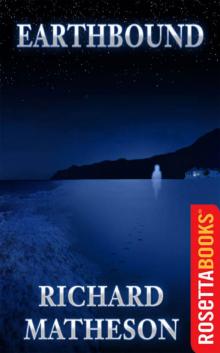 Earthbound
Earthbound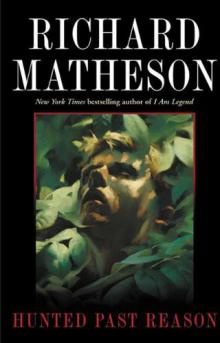 Hunted Past Reason
Hunted Past Reason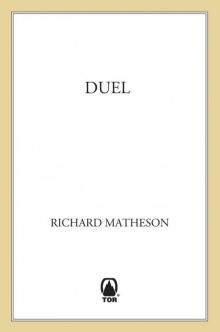 Duel: Terror Stories
Duel: Terror Stories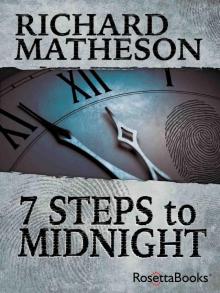 7 Steps to Midnight
7 Steps to Midnight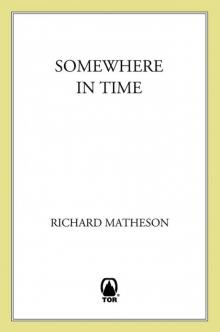 Somewhere in Time
Somewhere in Time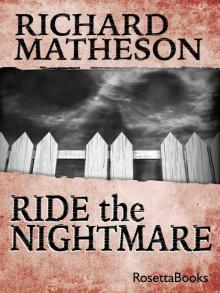 Ride the Nightmare
Ride the Nightmare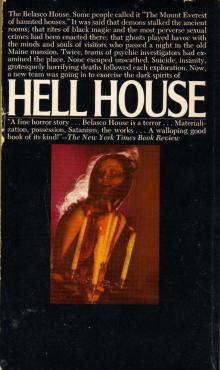 Hell House
Hell House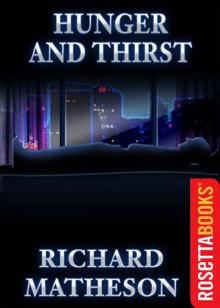 Hunger and Thirst
Hunger and Thirst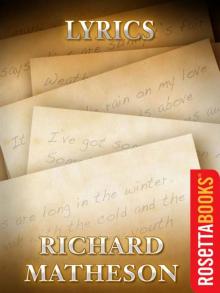 Lyrics
Lyrics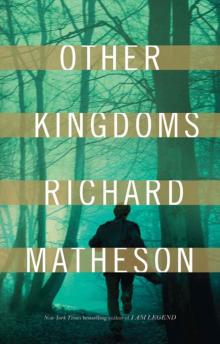 Other Kingdoms
Other Kingdoms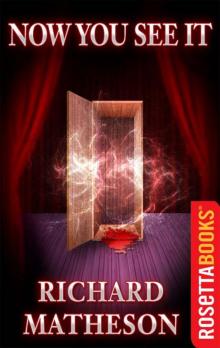 Now You See It . . .
Now You See It . . .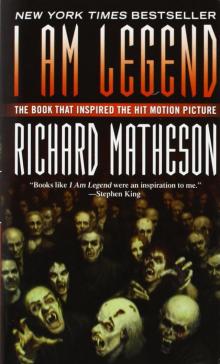 I Am Legend
I Am Legend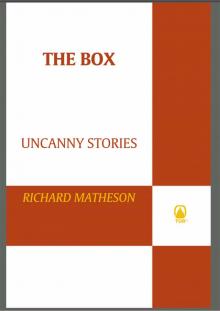 The Box: Uncanny Stories
The Box: Uncanny Stories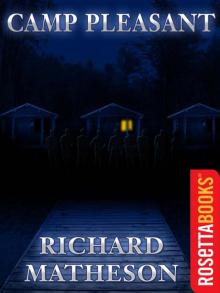 Camp Pleasant
Camp Pleasant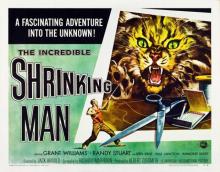 The Incredible Shrinking Man
The Incredible Shrinking Man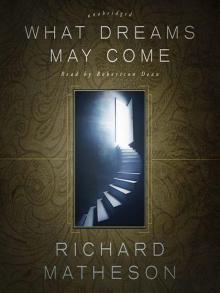 What Dreams May Come
What Dreams May Come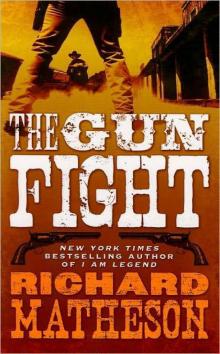 The Gun Fight
The Gun Fight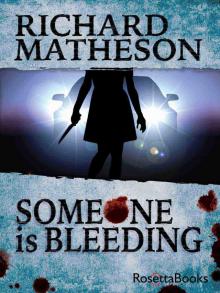 Someone Is Bleeding
Someone Is Bleeding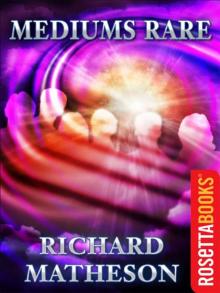 Mediums Rare
Mediums Rare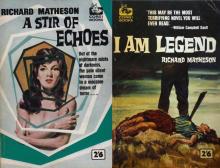 A Stir of Echoes
A Stir of Echoes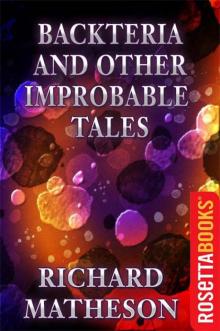 Backteria and Other Improbable Tales
Backteria and Other Improbable Tales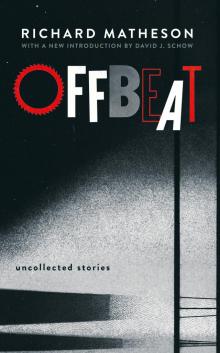 Offbeat: Uncollected Stories
Offbeat: Uncollected Stories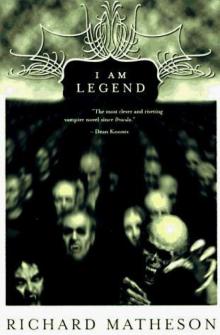 I Am Legend and Other Stories
I Am Legend and Other Stories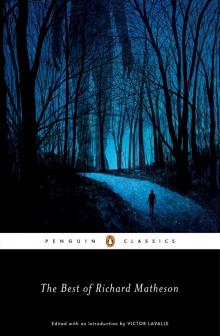 The Best of Richard Matheson
The Best of Richard Matheson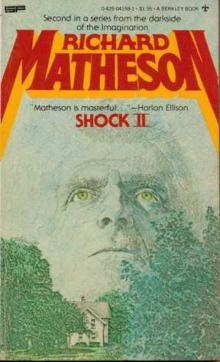 Shock II
Shock II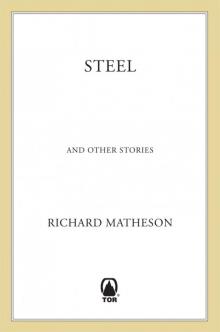 Steel: And Other Stories
Steel: And Other Stories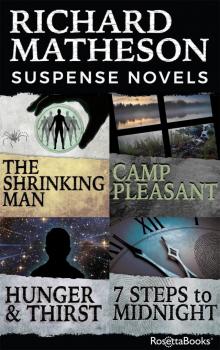 Richard Matheson Suspense Novels
Richard Matheson Suspense Novels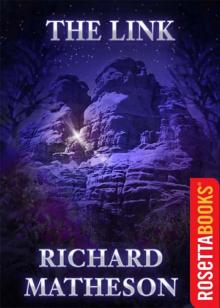 The Link
The Link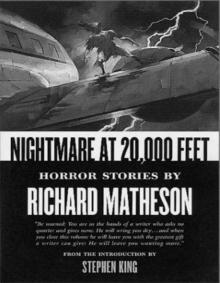 Nightmare At 20,000 Feet
Nightmare At 20,000 Feet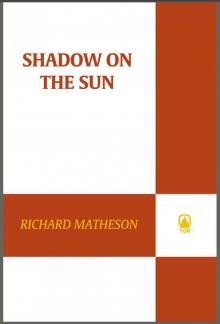 Shadow on the Sun
Shadow on the Sun![Steel and other stories [SSC] Read online](http://i1.bookreadfree.com/i/03/21/steel_and_other_stories_ssc_preview.jpg) Steel and other stories [SSC]
Steel and other stories [SSC]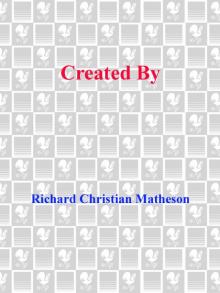 Created By
Created By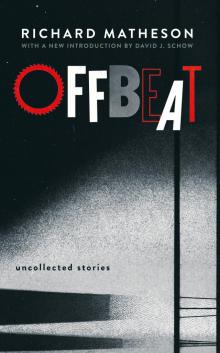 Offbeat
Offbeat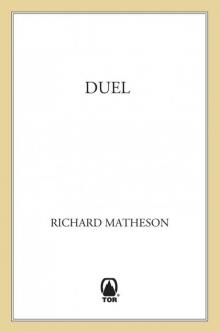 Duel
Duel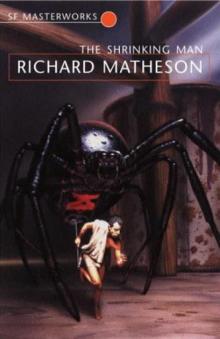 The Shrinking Man
The Shrinking Man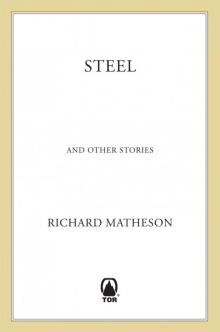 Steel
Steel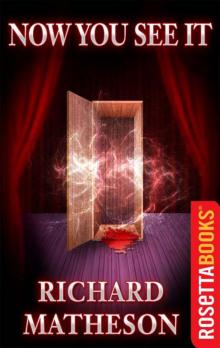 Now You See It
Now You See It